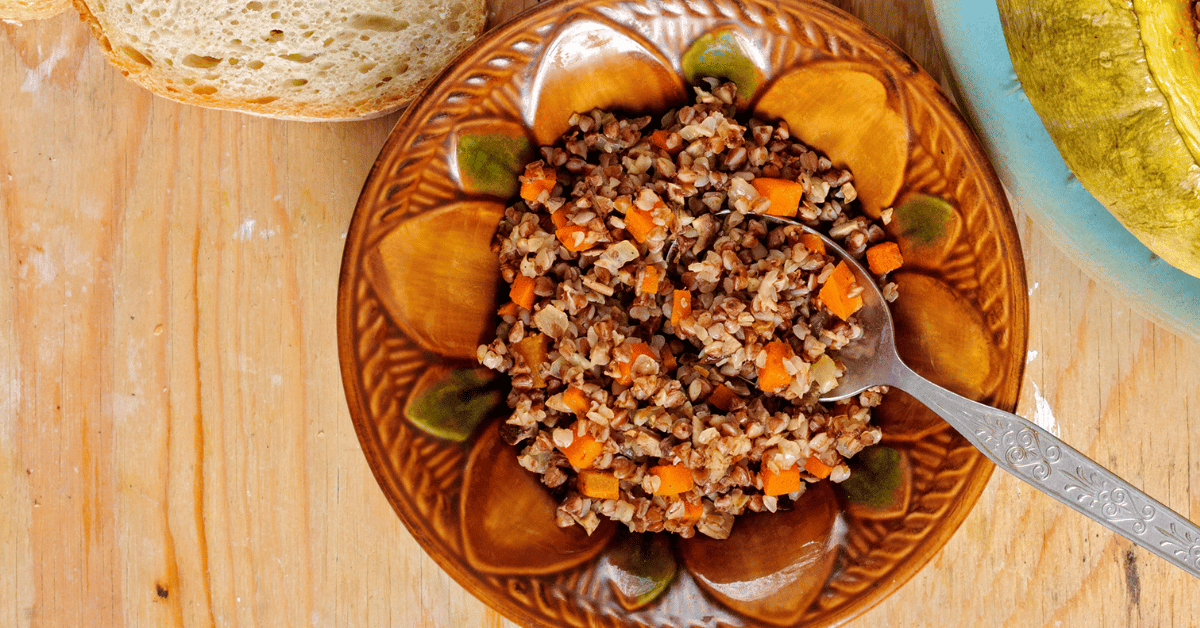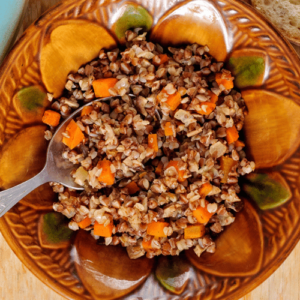Benefits of buckwheat

Buckwheat is not related to wheat and is actually a seed. It’s a highly nutritious, gluten-free food, that has been enjoyed for centuries. Rich in essential nutrients, buckwheat offers a wide range of health benefits, making it an excellent addition to any diet, especially for those seeking wholesome, plant-based options. Here’s why you should consider incorporating buckwheat into your meals:
1- High in Fiber: Buckwheat is an excellent source of dietary fiber, which is crucial for maintaining a healthy digestive system. Fiber helps regulate bowel movements, prevents constipation, and supports gut health by fostering beneficial bacteria.
2- Rich in Protein: Unlike many other plant-based foods, buckwheat contains all nine essential amino acids, making it a complete protein source. This is particularly beneficial for vegetarians and vegans who may struggle to get sufficient protein from their diets.
3- Gluten-Free: Buckwheat is naturally gluten-free, making it an ideal choice for those with celiac disease or gluten intolerance. It can be used as a versatile alternative to wheat in many recipes, offering similar texture and flavor without the gluten.
4- Low Glycemic Index: Foods with a low glycemic index (GI) are absorbed more slowly. buckwheat has a low GI, which helps maintain steady blood sugar levels, making it a great option for people with diabetes or those looking to manage their weight.
5- Packed with Antioxidants: Buckwheat is rich in antioxidants, particularly rutin and quercetin. These compounds help fight free radicals in the body, reducing oxidative stress and inflammation, and lowering the risk of chronic diseases such as heart disease and cancer.
6- Supports Heart Health: The combination of fiber, antioxidants, and magnesium in buckwheat is excellent for heart health. Magnesium helps relax blood vessels, improving circulation and reducing blood pressure, while fiber and antioxidants work together to lower cholesterol levels.
7- Boosts Immune System: Buckwheat contains several vitamins and minerals that support immune function, including zinc, magnesium, and B vitamins. These nutrients help strengthen the immune system, making your body more resilient against infections and illnesses.
8- Aids in Weight Management: Buckwheat is low in calories but high in nutrients, making it a satisfying and filling food that can help with weight management. Its high fiber content helps keep you full for longer, reducing the likelihood of overeating.
9- Supports Bone Health: Buckwheat is a good source of magnesium, phosphorus, and manganese, all of which are essential for maintaining strong and healthy bones. Regular consumption can help prevent bone-related disorders such as osteoporosis.
10- Versatile and Delicious: Buckwheat is incredibly versatile and can be used in a variety of dishes, from savory to sweet. Whether you’re making pancakes, porridge, or salads, buckwheat adds a unique flavor and texture to your meals.
Buckwheat recipe
Buckwheat is a nutritional powerhouse that offers numerous health benefits. It’s rich in fiber, which aids in digestion and promotes a healthy gut. Buckwheat also provides essential amino acids, making it a complete protein source that supports muscle growth and repair. Additionally, its low glycemic index helps regulate blood sugar levels, making it ideal for managing diabetes. The antioxidants in buckwheat, such as rutin, contribute to heart health by reducing inflammation and lowering blood pressure.

buckwheat recipe
Ingredients
- 1 Cup organic buckwheat groats
- 2 Medium organic carrots
- 1 Onion chopped
- 2 tbsp Organic coconut oil
- 1/2 tbsp Organic pink salt
- 1/4 tbsp Organic black pepper
Instructions
- Cook the Buckwheat: In a medium pot, bring 2 cups of water to a boil. Add the buckwheat groats, reduce the heat to low, and simmer for 15-20 minutes, until the buckwheat is tender and the water is absorbed. Set aside.
- Sauté the Vegetables: In a large skillet, heat the organic coconut oil over low heat. Add the sliced onions and sauté for 3-4 minutes until they begin to soften. Add the julienned carrots and cook for another 5 minutes, stirring occasionally.
- Combine: Add the cooked buckwheat to the skillet with the sautéed vegetables. Stir well to combine all the ingredients.
- Season: Sprinkle the organic black pepper and organic pink salt over the buckwheat mixture. Stir to evenly distribute the seasoning.
- Serve: Serve warm as a hearty and nutritious main dish or as a side to your favorite protein.
Benefits of Buckwheat Flour
Buckwheat flour is a versatile, gluten-free alternative to wheat flour that can be used in baking and cooking. It retains the nutritional benefits of whole buckwheat, offering high fiber content, complete protein, and essential minerals like magnesium and manganese. Buckwheat flour is particularly beneficial for those with gluten intolerance or celiac disease, as it provides a nutritious and delicious alternative to traditional flours.
Buckwheat Benefits for Skin
Buckwheat is beneficial for the skin due to its rich content of antioxidants, vitamins, and minerals. The rutin in buckwheat helps protect the skin from oxidative damage and aging, while its high magnesium content promotes skin elasticity and reduces inflammation. Regular consumption of buckwheat can contribute to a clearer, healthier complexion by supporting overall skin health from within.
Buckwheat Nutrition Facts 100g
A 100g serving of buckwheat provides approximately:
- Calories: 343 kcal
- Protein: 13.3g
- Fat: 3.4g
- Carbohydrates: 71.5g
- Fiber: 10g
- Magnesium: 231mg (58% DV)
- Phosphorus: 347mg (49% DV)
- Iron: 2.2mg (12% DV)
- Zinc: 2.4mg (22% DV) Buckwheat is a nutrient-dense food that offers a wide range of vitamins and minerals essential for maintaining good health.
Buckwheat Tea Benefits
Buckwheat tea, also known as soba tea, is a caffeine-free beverage that offers a host of health benefits. It is rich in antioxidants like rutin, which helps improve circulation and reduce blood pressure. Buckwheat tea also aids in digestion, supports weight management, and promotes relaxation. Its subtle, nutty flavor makes it a soothing drink that can be enjoyed any time of the day while providing numerous health benefits.
Buckwheat Side Effects
While buckwheat is generally safe and healthy for most people, some individuals may experience side effects. The most common side effect is an allergic reaction, which can range from mild to severe. Additionally, because buckwheat contains oxalates, excessive consumption may contribute to the formation of kidney stones in susceptible individuals. It’s important to consume buckwheat in moderation to avoid potential side effects.
Frequently asked questions:
Who Should Not Eat Buckwheat?
Individuals with a known allergy to buckwheat should avoid consuming it. Although buckwheat allergies are rare, they can cause symptoms ranging from mild to severe, including hives, swelling, and anaphylaxis. Additionally, people with a history of oxalate-related kidney stones should consume buckwheat in moderation, as it contains oxalates, which may contribute to the formation of kidney stones.
Why Is Buckwheat a Superfood?
Buckwheat earns its status as a superfood due to its exceptional nutrient profile. It is gluten-free, rich in fiber, and packed with antioxidants like rutin and quercetin, which combat oxidative stress and inflammation. Buckwheat also provides a complete source of plant-based protein, containing all nine essential amino acids. Its ability to support heart health, regulate blood sugar, and boost immune function makes it a standout ingredient in a healthy diet.
What Does Buckwheat Do for Your Body?
Buckwheat is a nutritional powerhouse that offers numerous health benefits. It’s rich in fiber, which aids in digestion and promotes a healthy gut. Buckwheat also provides essential amino acids, making it a complete protein source that supports muscle growth and repair. Additionally, its low glycemic index helps regulate blood sugar levels, making it ideal for managing diabetes. The antioxidants in buckwheat, such as rutin, contribute to heart health by reducing inflammation and lowering blood pressure.
